Caroline Leavitt's Blog, page 97
February 18, 2013
Pulitzer Prize-winner Glenn Frankel talks about The Searchers: The Making of an American Legend,
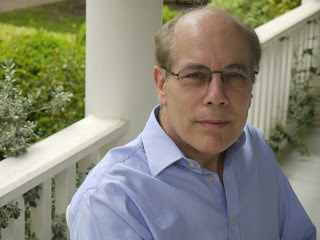
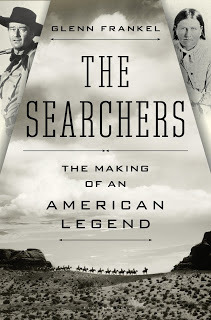
The Searchers is not just one of my favorite films--it's also one of Martin Scorsese's. Glenn Frankel's book, The Searchers: The Making of an American Legend, gets at the very heart of why and how this film is so important. He's the director of the School of Journalist and G. B. Dealey Regents Professor at the University of Texas at Austin, and he has been a visiting professor at Stanford, as well as a reporter and foreign correspondent for the Washington Post. He won the Pulitzer Prize for international reporting, and he's the author of Rivonia's Children: Three Families and the Cost of Conscience in White South Africa and Beyond the Promised Land: Jews and Arabs on a Hard Road to a New Israel. I'm honored to have him here.
The Searchers is actually one of my favorite films because it’s so disturbing. But as you so brilliantly point out, the film upends the novel it was based on, which centers on the true story of a white girl, Cynthia Ann Parker, captured by Comanches, who’s rescued as an adult, only to live in misery. Do you think the film would have been as equally disturbing if Ford had focused his story on Parker?
Actually, it was the novel that up-ended the original story by shifting the focus from Cynthia Ann to the uncle (and fictional adopted brother) who searched for her, and Ford followed the narrative path LeMay had established. LeMay and Ford were interested not so much in the abduction and in the life of the victim, but on the effect these traumatic events had on the pioneer community and the family. I do believe someone could make a terrific film about Cynthia Ann's life and the terrible price she paid. It would illustrate the human cost of the long twilight war of populations between Texans and Comanches. But it would have a very different focal point than The Searchers.
So much of your book, to me, is about the stories we tell others--and ourselves. While there were reports from white women about the brutality of Comanches, there were also reports of the Comanches; tenderness towards their children. So much of The Searchers, “a myth based on other myths” is infused with John Ford and John Wayne, that I wonder, do you think, unless someone writes, directs, produces and acts--that a story can ever be a pure one, especially since even readers bring their own experiences and feelings and prejudices to a story?
You're absolutely right in seeing the theme of storytellers and the way they use stories to explain the world to themselves and themselves to the world. Every story is a subjective one, and is influenced and shaped by the sensibility and the needs of the storyteller, and every story is received differently by the reader, audience, etc. So no story is "pure." Still, stories are universal: they have power and meaning and can be appreciated, albeit in different ways, by succeeding generations. We see things in The Searchers that an earlier generation may have missed or interpreted differently. I was surprised to read that the film was perceived in its time as just another pretty good John Wayne cowboy movie. It's only over time that people have come to understand its terrible power and what it says about race and love and gender.
Can you talk about how The Searches both upholds and undermines the myth of the savages vs. the noble white pioneer?
This is one of John Ford's great gifts. In The Searchers he presents the mythic John Wayne, our cinematic hero---the Indian fighter, the lone avenger, the charismatic seeker of vengeance and justice. We identify with Wayne because of his charisma. At the same time, we begin to see his flaws: he shoots the eyes put of an Indian corpse, scalps another corpse, breaks up a funeral service, and we begin to understand that his search for his niece has turned into a mission of retribution. Our dark knight intends to kill the damsel because she has been defiled by savages. At the same time, the purported savages themselves become humanized. We see the aftermath of a massacre of a Comanche village by troopers and we begin to understand the motives of Scar, the war chief, and to understand that he and Ethan, the Wayne character, share the same hatreds. The Searchers acknowledges and even embraces our conventional myths, then works hard to make us think twice about them.
Do you think that the fact that The Searchers is morally ambiguous is what will keep it a classic?
It's not moral ambiguity so much as artistic ambiguity that makes The Searchers a work of cinematic art. In so many places, Ford deletes the dialogue and exposition and simply gives us the visual narrative, leaving us to decide what it means. When the camera zooms in on Ethan's face at the fort where he has seen the deeply disturbed white Indian captives: is the expression on his face one of madness, despair or anger? Is it then he decides he will kill Debbie when he finds her? Ford doesn't tell us, and we must decide for ourselves.
Similarly, when Ethan runs Debbie down and must choose whether to kill her or rescue her, why does he make the decision he does? The shooting script has him utter a line that makes clear why he makes his decision, but Ford deleted it. He wants us to decide for ourselves. It's a wonderful artistic choice Ford makes.
What's obsessing you now?
1) Helping our students at the School of Journalism prepare for a very exciting but uncertain future.2) Figuring out how to talk about the vast amount of material and characters in my book in a 30-minute talk. Do I emphasize 19th century Texas or 20th century Hollywood? Cynthia Ann Parker or John Ford?
There are so many other questions we could discuss, Caroline. But these were great ones. I'll leave it here for now. Thanks for being such a thoughtful reader---it's all any author can ask for.
Best, Glenn
Published on February 18, 2013 18:06
February 11, 2013
New literary star Megan Fishmann talks about her unsettling new story in Five Chapters, writing a novel, and so much more
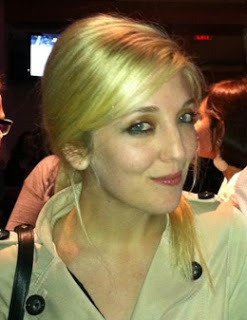
My first publicist at Algonquin Books was Megan Fishmann. She came with me to GLIBA, acting as my escort and quickly became my partner in crime. I was heartbroken when she left to move to San Francisco with her new husband, but thrilled that we kept in touch and when she told me she was writing a novel and she showed me a section at the prestigious FIve Chapters, I thought my head would explode. It's brilliant. And I think everyone should know about Megan before she becomes so famous you won't be able to get near her without an appointment six years in advance. It's my huge pleasure to interview her. Thank you, Megan!
This story is one of the most brilliantly unsettling tales I've ever read. It's raw and funny and disturbing and hilarious all at once. Where did the idea spark? It's part of a novel, too, so can you tell us a bit more about the novel as a whole?
Oh my goodness, thank you so much! First and foremost, it is an honor being able to chat with you, Caroline. In terms of the idea, it actually came about two ways. About nine years ago, I read an article in The New York Post (of course!) that was just heartbreaking: a baby really had been accidentally sent to the hospital Laundromat instead of the morgue. I saved that article for years (I still have it in an accordion file buried somewhere) because I knew that I wanted to write about it at some point.
Second, in terms of the house, many summers ago, an ex-boyfriend of mine housesat for a professor at Princeton. I visited the house one weekend and was just astonished how enormous and eerie and beautiful it seemed. What secrets were hiding there? Somehow I knew that the house and the Laundromat were linked: it just took me a few years to figure it out.
Finally, in terms of the novel, it follows three different characters over the years: Caroline, Henry and Caroline’s sister, Lucy. Traveling back and forth through time, readers learn early on that Caroline has committed an unforgivable crime in Tokyo and for the rest of the novel, we learn what she committed, how this affects a sisterly bond and how it will forever connect her to Henry in mysterious ways he could never imagine.
What's your life as a writer like? Do you have rituals? Do you outline or just follow your pen?
In terms of my life as a writer, I always write at my kitchen table. I had a writing desk for years that I never used. There’s something about writing at the kitchen table, in all that open space, that makes feel like I can dance around the room if I need a break. Funny enough, my husband’s wonderful aunt Holly just gave us a new table for our wedding so I’m curious to see what it will be like writing on it. It’s made of teak, which is one of the strongest woods in the world (I’m clearly looking into the symbolism of writing onto such a powerful object from nature).
I don’t outline, per se, but I have been sticking one thousand Post-Its on the back of a closet door, to make sure that my timeline is correct. With the book jumping back and forth through time, it’s important that I make sure my details and timing are as accurate as possible.
In terms of ritual, when I workshopped with Tony Earley this summer, he mentioned that he always goes over his old work the next morning and rewrites part of it until it’s just right. So now, not only do I start my writing off with that, but also after about a month, I print out my work and edit it by hand. It’s amazing to see how many tiny errors I may have missed or how many sentences I will mercilessly cut out (despite my previous attachment to them).
You began your career as a publicist--and I can attest how wonderful you were at that job--and now you're on the other side of the fence as a novelist. What in your life as a publicist has helped you in your new life as a novelist?
First and foremost, I will shout from the rooftops that working with you was an absolute dream and for anyone who gets the chance to work with you, they are in luck. I’ve been working in publicity for nearly ten years now and it’s both frightening and exciting to see how much publishing has changed. If anything, I would say that I’ve learned it’s up to writers to promote themselves just as much as their houses promote them.
I will also say that through a writer’s own self-promotion, it’s really important to show support to others in the writing community as well. Indie bookstores like Book Passage in San Francisco or BookCourt in Brooklyn are just two examples of the many incredible people/stores I have had the chance to work with. And what’s great about promoting/sharing someone else’s story is that maybe you’ll get lucky (like I did!) and another writer will be happy to share your work with their readers and friends later on down the line.
What's next after this novel?In all honesty, I’m wondering how I can go about witnessing an autopsy (if at all possible). That’s not a very light answer, is it? Once I get this novel out the gate, I’d like to go back and continue working on my second book (which follows burial practices around the world). I recently read Mary Roach’s “Stiff” over the holidays and found myself taking copious notes…
What's obsessing you now and why?Well, right now it’s both the book and the historical/factual accuracies in it, despite it being fiction. A huge portion of the novel takes place in Japan and I’ve been researching a lot about the country to make sure my work is accurate. Recently, my husband gave me a copy of Bruce Feiler’s “Learning to Bow: Inside the Heart of Japan” for inspiration. My main character Henry becomes an ESL teacher in Tokyo and I realized that there’s so much about the school system (and how it’s different than ours) that I didn’t take into consideration. So right now, I’m trying to learn as much as I possibly can on the subject. I’m hoping to return to Tokyo this summer: it truly was the most beautiful city I’ve ever been to.
What question didn't I ask that I should have?There are so many questions I’d want to answer! If there’s one thing I’d like to end on, it’s ‘what writing advice would you give to others?’ I think for a long time I thought that a book would just magically happen but it doesn’t work that way. Writing is like training for a hotdog eating competition. You can’t just run eat a few dogs a day and then think you’re ready for the big leagues. You have to keep at it, religiously, working every day, until the moment happens when you can look at the draft and think, ‘Yes. It’s done.’

Published on February 11, 2013 10:59
David Toomey talks about Weird Life, whether the universe is a computer simulation, multiverses, and so much more

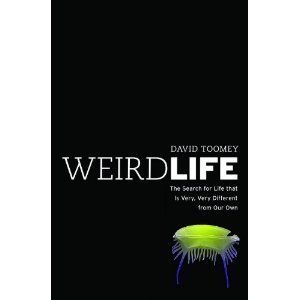
We spend a lot of time in our household talking about things like parallel universes, time travel, and the fact that the universe is probably much stranger than anyone could imagine. When David Toomey's extraordinary book, Weird Life, came through our door, Jeff grabbed it up first before I could get to it. Both of us were so enthralled, I had to track David Toomey down to interview him. What's most remarkable is that he's not a scientist. He's an associate professor of English and the director of the Professional Writing and Technical Communication Program at the University of Massachusetts Amherst. He's also the author of The New Time Travelers and Stormchasers. (I've just ordered both books, and you should, too.) This has truly been one of the most fun and illuminating interviews I've ever given. Thank you so much, David--and I hope the world is not a computer simulation.
What is weird life and how does it differ from life as we now know it?
Weird life is life that is radically and fundamentally different than life we know. All life we know – and here I really mean all life – you and me, an oak tree, a giant squid, a turnip and a bacterium – share a great many common features: the same lipids in cell walls, inside those cells, the same amino acids and proteins initiating and accelerating the same chemical reactions in precisely the same ways. It is such common features that lead biologists to suspect that all like we know is descended from a single common ancestor: a microbe that lived some 3.5 billion to 3.8 billion years ago and (luckily for us) reproduced.
“Weird life” then, is a catch-all term for life that is not descended from that ancestor, and thus does not share some of the features of life we know. Biologists and other sorts of scientists have hypothesized many sorts of weird life. Some might be only slightly weird, using say, certain amino acids not used by familiar life. Some might be moderately weird, perhaps enabling its chemistry not with water but with a liquid like ammonia or liquid methane. Some might be very weird, like for instance, living interstellar clouds of dust grains and complex molecules organized by electromagnetic forces. It should be said that all weird life, at the time of this writing, is theoretical. No one has found any—yet.
2You’re an English professor, not a scientist. How did you research this book and teach yourself about the scientific principles involved in understanding the issues?
This was a particularly challenging topic because papers are published in many of the sub-fields of biology in a great many journals, and there’s no single dialogue of which everyone partakes, no single journal in which all these scientists publish. But a National Research Council Report called The Limits of Organic Life in Planetary Systems helped me identify which articles on the subject were worth looking at, and I was careful to read most of those. Otherwise, my research strategy was the tried and true. I found relevant articles, printed them out and read them, most often with a microbiology glossary and a couple of textbooks at my side. Of course, I also interviewed a number of biologists for the book, and quite often asked them to repeat something or explain it to me. I am all too aware that I have no real training in biology or microbiology – and that probably makes me all the more worried that I’ll get something wrong, and all the more careful.
You discuss the possibilities and probabilities both of life (weird and otherwise) existing and not existing throughout the universe (or multiverses), but you are careful not to commit to a position. In your own opinion, based on what you now know, do you think we are alone or, given the math, is that unbelievably arrogant and naive of us to think we are alone?One reason I don’t commit to a position is that, even after thinking and reading about the question for a few years, I don’t think I know enough about this to have one. I’m not sure anyone does. There are sound arguments for both positions. On the one hand, there are billions of stars as potential suns, and tens of billions of planets now estimated to be orbiting them. Life’s most basic needs—energy and matter—are met in many places in our universe (and if they exist, others), and have been met for billions of years. Given this math and these numbers, it would indeed seem arrogant of us to think there’s no life anywhere else. On the other hand, the chemical reactions that occur within a living cell are fantastically complex, far more complex than most of us realize. While it’s true that astronomers have identified amino acids (famously called life’s “building blocks”) in deep space, amino acids are relatively simple molecules of only a few dozen atoms. It takes thousands of amino acids arranged just so to make a protein molecule, and thousands of protein molecules of various sorts must be manufactured every second in a single cell, if that cell is to continue to function. Many of the steps that lead from amino acids to proteins are only imperfectly understood, no one really knows exactly how complex chemistry develops into simple biology, and it’s far from certain that the process is common, let alone inevitable. Given this math and these numbers, it would seem that life of any kind might be quite rare.
Toward the end of the book you spend time with the concept of humankind being a simulation, basically an experiment or plaything controlled by an outside force. Isn’t that basically the crux of religious belief (which is not mentioned in that discussion)--that God created us and everything else and knows all and controls all? What’s the difference between the idea of a deity calling all the shots and all of us being nothing more than players in an elaborate piece of software? The question is fascinating, and leads to some very deep philosophical and theological waters, worth a whole book in themselves. A number of other writers (Paul Davies and Nick Bostrom for instance) have spent a good deal more thought on this question. For Weird Life, I thought it prudent to limit myself to aspects relevant to definitions of life.
But since you asked, I’d say offhand that it’s possible that there is no difference between a deity calling all the shots and all of us being nothing more than players in an elaborate piece of software—or no meaningful difference, anyway. The notion of some incredibly powerful but emotionally and ethically under-developed super-intelligence controlling our lives may be fairly abhorrent, especially to those of us who would wish our gods to practice a higher morality. But because an idea is abhorrent doesn’t make it any less likely. I’d also have to note that the idea isn’t exactly without precedent. The gods of Greek and Norse mythology for instance, were seldom well-behaved, and interestingly enough, humans didn’t expect them to be.
Do you think we’re more likely do discover weird life on our own planet or someplace else first, and what kind of weird life is that most likely to be?
I think that where we discover weird life, if we do, will be somewhat determined by where we look first, and how hard we look. It is possible that there is microbial weird life on Earth, all around us, in the air we breathe, in a pinch of soil outside your door. A dedicated search program for that life might yield results soon, but at present there is no such program. Of course, someone might discover it accidentally, while he or she is looking for something else. We might someday discover it someplace else—beneath the surface of Mars, on Saturn’s moon Titan, or on Neptune’s moon Triton, for instance. But to be sure it’s weird life—that is, actual biology and and not merely some exotic chemistry—we’ll need onsite scientist-astronauts, very sophisticated unmanned probes, or at the very least sample-return missions. And at present, no such missions are being planned by NASA or ESA (the European Space Agency). As to what kind of weird life we discover first—a great many biologists suspect it will be microbial, this because microbes make up most of Earth’s life, and until quite recently (on geological timescales) they made up all of it. If our planet’s history is any guide, then microbial life is the first sort to arise, and large, complex organisms appear much later if indeed they appear at all. So I’d venture to say that the smart money is on microbes. Of course, if the radio astronomers and other scientists involved in the Search for Extraterrestrial Intelligence detect that long sought-after radio signal, the smart money might be wrong, and the first weird life we encounter will be intelligent. Wouldn’t that be interesting?
Published on February 11, 2013 10:42
February 9, 2013
Sara J. Henry talks about A Cold and Lonely Place, making setting a character, wanting a personal assistant (hey, me, too!) and so much more
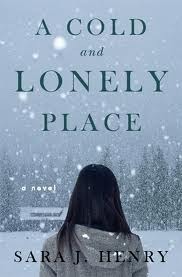
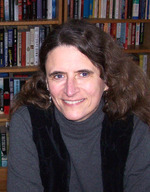
I first met Sara J. Henry at the Brattleboro Book Fest and we went out for lunch and promptly bonded. Her novel, LEARNING TO SWIM, won the 2012 Anthony Award and 2012 Agatha Award for best first novel and the 2012 Mary Higgins Clark Award, was an Emerging Author pick at Target, and was a finalist for the Barry and Macavity awards. The Boston Globe named it one of the best crime novels of the year: "Compulsively readable, this is all about what we do for love." And the sequel, A Cold and Lonely Place, is even better. I'm so thrilled to have her here. Thank you, Sara!
Q: What was it like to write about Troy Chance again? Did anything surprise you?
A: Troy is a part of me, so writing about her is very natural. What was different this time is that because the first book was out, other people knew Troy, or thought they did, which meant some expectations. I knew Troy’s emotional honesty was one of the things that drew readers to her, and knew I had to continue that. And it was harder to do the second time – it’s easy to lay your character’s thoughts and emotions bare when almost no one has read the book and you have no real expectation of more doing so.This was also the first time I had someone in publishing suggest that Troy say or do certain things that I knew she would never ever say or do. Not that I changed those things, because they simply didn’t fit, but it was disconcerting to have someone else trampling around in Troy’s world and trying to speak for her, and it threw me off for a bit.Q: You’ve lived in a lot of different places. How does a sense of place inform your work and how and why is it important to you personally?A: In these books, and particularly in A Cold and Lonely Place, the setting is so integral that it becomes almost another character. I lived in this area of the Adirondacks from age 26 to 30, and again for a year not long ago, and in a way this area embedded itself in me. It was a big move, to a cold and somewhat desolate area where I knew no one and was doing a job I was in no way prepared for, working sometimes 70-hour weeks on a small newspaper, covering sports and events that were the lifeblood of these communities. This was where I came alive as a writer, turning out in-depth features on sled dog racers and visiting Olympians while also covering three high schools and two community colleges and an extraordinary range of area sports (softball is very important in a small town) and managing a rental house filled with transient athlete roommates. In a way this was where a way where I came alive, period. Part of my heart is still there.Q: Let’s talk craft. What’s your writing life like? Do you write every day, do you carry a notebook, do you outline?A: I have a friend who has a rigid writing schedule, writing from, say, 8 to noon, or until she has X numbers of words. Um, that’s not me. When I’m writing I write madly, and may forget to eat or leave the house. Writing creatively I do in the morning, before other things begin to clutter my brain, or in the evening when I’m tired enough to let go. Editing and revising I can do any time. I know when something’s not working, and I don’t give up until it’s fixed. A Cold and Lonely Place had some pacing problems early on that I kept picking at until I figured out that one scene was in the wrong place, another needed to be split in two, and one character appeared in the book sooner than he should. I fixed those things – and, presto! It was so clearly right I wondered why it had taken me so long to see it.I don’t keep a notebook. I dream up the story – sometimes a long car ride when my mind can roam – and write a bare bones one-page outline that I may expand as I go. I put the story into action, and sit back and let the characters determine how things progress. Sometimes they surprise me, and I love that.Q: What’s obsessing you now?A: The novel I wrote half of last March and had to drop for other things. It’s calling to me, but I don’t dare pick it up because of all the publicity-related things I need to do for this new book. Because once I do, I’ll forget all the mundane things like scheduling bookstore appearances and such, and just write madly.Q: What question didn’t I ask that I should have?A: If you had a writing genie, what would your three wishes be?A cook. A personal assistant to set up events and remind me to do interviews and order ink cartridges, and oh, maybe carry in firewood and walk the dogs once in a while. Enough of a travel budget to visit every bookstore I want to visit. (I could go on, but I think I just ran out of wishes.)
Published on February 09, 2013 15:07
February 8, 2013
Love is Strange: my essay in the NYT Modern Love
I'm thrilled to report that my essay about finding beauty in the strange and the odd is appearing in Sunday's New York Times Modern Love!
Published on February 08, 2013 07:58
February 3, 2013
Psst, want a manuscript edit/consult?
Got a novel on your desk but you know something isn't working and you have no clue how to fix it? I've been teaching all levels of novel writing at UCLA for years (and I won an award for it) and I recently started doing teaching at Stanford. (Both are online.) But I also work with writers privately, helping them to get their novels in shape. Many of my clients are referrals from agents or from word of mouth, and it's been my pleasure to see them get their books out into the world and garner the attention they deserve.
It's work I love, because being able to do this for others isn't just fun, it truly helps me figure out the snags in my own work.
If you're interested, please contact me at carleavitt@hotmail.com and I can tell you all the other details. I promise it's fun.
It's work I love, because being able to do this for others isn't just fun, it truly helps me figure out the snags in my own work.
If you're interested, please contact me at carleavitt@hotmail.com and I can tell you all the other details. I promise it's fun.
Published on February 03, 2013 19:55
Katherine Bouton talks about Shouting Won't Help: Why I --and 50 Million Other Americans--Can't Hear You, Owning a disability, and why we should give up our love affair with noisy environments
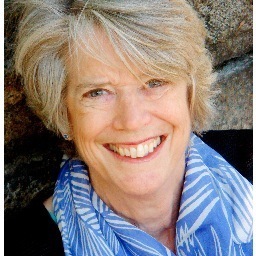
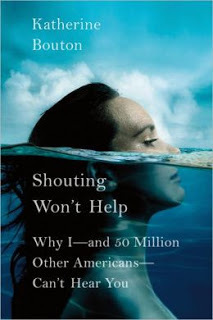
Katherine Bouton is a former editor for The New York Times and a current contributor to their Science Times Section. But for 22 years, she kept her growing deafness a secret. She now has cochlear implants and hearing aids, and her book, Shouting Won't Help: Why I--and 50 Million Other Americans-- Can't Hear You, is fascinating, profound and important, chronicling her coming to terms with her hearing loss, and exploring the stories of others. And the book has special meaning to me.Sixteen years ago, I gave birth to my son and became critically ill, and was not expected to survive. Some of the meds that saved my life were ototoxic, and though I got completely well again, my hearing became a little wonky. Like Katherine, for a long time, I ignored the problem. I refused to consider anything was wrong, mostly because I felt desperately ashamed. Would people think less of me if they knew? Would I be cut off from the busy world I loved? I discovered, that owning up, letting others in, actually increases intimacy--the same way a pair of hearing aids helps in group settings. I'm more in the world than I ever was before--and truthfully, there is nothing more powerful and healing than giving up shame. Nothing more brave.Katherine's journey from acceptance to action is inspiring. Shouting Won't Help is an astonishing book and I'm honored to have Katherine here. Thank you, Katherine.
I loved that you wrote about “talking back to your impairment,” and owning it. Can you talk a bit about that please?
When you lose one of your senses, or the use of a limb, or if you have a mental illness, you tend to identify yourself in terms of that impairment. You say, I'm an amputee. I'm schizophrenic. I'm hearing impaired. The disability comes first, you come second.
But what you learn as you come to terms with the loss is that you're still the person you always were, with an added factor. The politically correct way to refer to someone like me is as a person with hearing loss. That's fine. I am a person, and I do have hearing loss. Advocates for people with hearing loss don't like the term "hearing impaired" and they really don't like deaf. The Deaf (the culturally deaf, who use sign language) don't like the appropriation of the term either. But the fact is that I can't hear a thing without my hearing aid and cochlear implant. I'm deaf.
So I happily use all three: I'm a person with hearing loss, I'm hearing impaired, or I'm deaf, depending on my mood. The first two I use when I'm feeling sorry for myself or ill at ease. "Deaf" I use when I'm comfortable, making light of the situation.
Can you also talk about how writing this book freed you in some way?
I was a champion denier. I told almost no one except close friends that I had hearing loss, and I told my close friends a modified version of the truth. Even my family didn't know. My son transcribed some of the tapes of interviews I did and at one point he said, "Mom, I had no idea what you were going through."
I lost my newspaper job in part because I refused to acknowledge my handicap and the need for accommodation. Once I was gone, I didn't know what to do with myself. So I decided to write a book. The only subject that really interested me was hearing loss. And the only way to write about it was personally. When I wrote my original proposal I struggled to find the voice I wanted to present. I was at that point quite depressed about my hearing loss but with every draft I got a little more upbeat. Finally, just before my agent submitted the book to publishers, he suggested that I end the proposal with something that I'd gained from hearing loss, a happy ending. And once I wrote it it was true. Here's what I gained: Closer, more intimate friendships -- especially because I did fewer group activities and saw friends more often one on one. A new more honest relationship with my family. A new understanding of what it means to have a hidden disability. I'm a better person for it.
What are some of the ways people who hard of hearing can come to that elusive state of acceptance?
One way is to go out and meet people like yourself. Almost every area has a local branch of the Hearing Loss Association of America, and the HLAA annual meeting is an event I would recommend to anyone. The first year I went to the annual meeting I was literally awestruck at the variety and sheer number of people with hearing loss. Many of them were young, many were clearly professionals. The workshops and talks were illuminating and helpful.
I think you first have to acknowledge your loss to yourself. You have to stop saying: My wife mumbles. It's too noisy in this restaurant. Then once you find out you have hearing loss, treat it. Get a hearing aid, work and practice with it. You may never need to tell anyone you have hearing loss. But if it gets to the point where you still aren't hearing well, then come clean. I was amazed at how understanding people were. I've made so many friends I'd have been reluctant to talk to before, simply by starting the conversation with the information that I have hearing loss.
And why do some people use hearing loss as a protection?
One of the people I interviewed for the book was a psychoanalyst in Seattle, Jacqui Metzger. She herself has hearing loss, as do some but not all of her patients. She told me a story about a new patient who came to her and who, after a few sessions, still seemed oddly removed, not interacting with her. She said, "I have this sense we're somehow missing each other as we talk. I wonder if you have a hearing loss." The patient acknowledged that that was the case. "We talked," Dr. Metzger told me, "and over time we came to understand that not wearing hearing aids was a way of keeping people at a distance." Now she says, not only does her patient have a better relationship with her but he's discovered the satisfaction in closer relationships with other people.
Can you please talk about how you came to accept your own loss?
I got tired of having people think that I was stupid, or aloof, or uninterested. I decided that it was better to own up to hearing loss. The first step I took was going to the HLAA national conference. After that, it became easier to tell people. There's still a part of me that's reluctant to tell, however. Old stigmas die hard.
There's a very funny scene in The Hunchback of Notre Dame, where the deaf and dumb Quasimodo is brought before a judge, who is himself deaf but refuses to acknowledge it: "It was better to be seen as an imbecile than deaf." I decided I didn't want to be seen as an imbecile any more. And then, as I said above, once I began to meet other people with hearing loss it became much easier to accept it as a part of myself, a part that I was simply going to have to make the best of.
I was surprised to read that while hearing impairment strikes any age, most people will wait until their seventies to get a hearing aid. What kinds of things do you think we can do to change this?
This is a concrete example of the stigma of hearing loss. People don't want to be seen as deaf, because deafness is considered a disability of old age. That simply isn't true. The vast majority of the elderly with hearing loss lost their hearing before they were 60. It's probably worsened as they age, and that may account for greater hearing aid use. But I think it's also a reluctance to admit to hearing loss when you're part of a society that so values youth.
One of the more fascinating things you write about is the dilemma of parents of hearing impaired kids, and whether they should offer their kids cochlear implants now or wait, hoping to avail their kids of the new technology that could possibly regenerate hearing cells.
This is a hard decision. I do know that the younger a child is given implants, the better he will learn to hear and speak. There are no studies yet of the long term academic achievement of children implanted before the age of 18 months, but they do much better in the early school years. Implants in children are recent enough that children implanted at that optimal young age have not yet reached high school and college.
As for waiting, that research is fascinating but even the researchers say it will be many years before this technology is available to humans. They expect that within a decade they may have mastered the basics, but then there will be decades of safety and efficacy testing, developing sophisticated techniques and so on. If it were my child, I think I'd go for two implants right at the start.
There is, of course, also a section of the deaf community, that is against implants or regeneration, because they want to preserve what they see as deaf culture. Can you speak about that?
I'm sympathetic with the Deaf wanting to maintain a strong community based on a common language, American Sign Language. What I take issue with is imposing that belief on others. There is a powerful documentary (available on Netflix) called Sound and Fury. It follows two brothers, both members of the Deaf community as they consider getting implants for their children. Feelings run high -- the film is very intense -- and relatives say cruel things about the mother who wants to get the implants for her newborn: "If she doesn't want the baby because he's Deaf, I'll take him" or "My friends wonder why she won't love her own child, even if he's born deaf."
What question didn't I ask that I should have?
You haven't asked about noise, which is the major cause of hearing loss in the country, by a long shot. Noise in restaurants, sports stadiums, at rock concerts, on city streets, at Nascar races, out hunting, in subway stations -- it's all unregulated. OSHA recognizes the dangers of noise in the workplace, and requires noise protection. But once you're out in the world, you're on your own. Chapter 3 is about our love affair with noise. I was astounded at the decibel levels recorded at football games or in chic restaurants. I was also interested in the psychology behind amping up the sound (you'll have to read chapter 3 -- it's complicated). Noise is the number one cause of hearing loss and it's completely preventable.
Buy the book: http://us.macmillan.com/shoutingwonthelp/KatherineBouton#buy-the-book
Visit Katherine on twitter: @katherinebouton
Published on February 03, 2013 10:08
February 2, 2013
Ariel Joseph Towne, the Feng Shui Guy, talks about Serene Makeover: Inner Edition, making yourself over from the inside out, and so much more
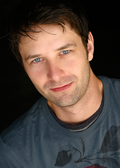
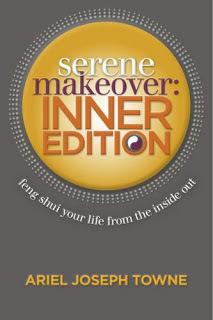
I have friends who have Feng Shui'd their homes and claim amazing results. In fact, this book, Serene Makeover: Inner Edition, was put in my hands by the brilliant novelist Gina Sorell, who was sure I'd love it, and she was right. The book offers practical and easy ways to make your world better. But don't just listen to me. The Huffington post calls it "a delightful guide to the inner and outer workings of energy." Thanks so much, Ariel for being here.
How did you get involved with Feng Shui? I’ve always been sensitive to energy. As a kid, I could sense the feelings of a room. The tension in a room. Or the happiness. And those feelings weren’t always connected to the people that were in there. Sometimes it was as if I was feeling the history of a room. Sometimes it felt good and sometimes it didn’t feel so good to me.
As a teenager I would move my furniture around every few months. Or change all the artwork. Things might be messy when I would get busy and then all of a sudden I would feel the strong need to do a sudden purge, or clean everything from top to bottom. It was like an itch that I needed to scratch. But at the time I had no idea why.
It wasn’t until after I moved to California that I had ever heard the term feng shui. It was recommended to me after I moved into an apartment that I couldn’t afford. It was my first time ever living on my own and I was nervous. How would I pay for it all? Would I get lonely? How do I set up a whole space and not just a single room?
My feng shui master is Hawaiian. He came to my empty home and sat on my floor with me. I had no furniture. We spoke for almost five hours that day and it ended with a blessing. When it was finished, I told him that the chant he had been doing was something that my mom had taught me growing up. It was a Sanskrit blessing: Om Mani Padme Hum. It made me feel comforted. This was almost two years after my mom passed away and I felt like this feng shui was connecting me to her somehow. And it made me happy.
How and why did you decide to bring it to the people in such a playful and fun way? My feng shui master, Nate Batoon has an incredible sense of humor. He is always cracking jokes. I think that it makes it easier to learn when you are having fun. His most successful student to date (my friend and mentor) Karen Rauch Carter has an incredible sense of humor. Her book: Move Your Stuff, Change Your Life was the first book I ever read about feng shui. It is simple, profound and funny. I always recommend it to my clients. And when people started asking for my advice…I tried to read people. When did they tune out? When was the information overwhelming? I would get them to laugh and we would be back on track. As a result, these three qualities have always been part of my workshops and my consultations. Sometimes this work can bring up a lot of “stuff” for people. Laughter helps people make space to take in something new.
When I first picked up the book, I thought it was going to be about rearranging my home, but it's much deeper--about rearranging myself!
Can you talk about that, please?There are lots of books in the marketplace on how to arrange your home or business. Some of them are incredibly complicated and some of them are easier to follow, but they all address our outer environments. If they made any reference to inside, it was in passing. Most of these books are “how to” set up our external environments.
After working with people for ten years I noticed certain patterns. Firstly, I noticed that people’s spaces are a reflection of what was going on inside of them. When they made changes in their homes it was because some part of their space wasn’t any longer being reflected on the outside. But then when we made these changes outside, it would affect the way they felt inside (more peaceful, more energized, happier, excited, passionate, etc)
Over time, people would get addicted to the positive results that followed our actions together. Sometimes they would think…if a few simple changes affected my life this profoundly, they surely more is better! So they would buy some bamboo flutes and money frogs and strings with coins on them and pretty soon their homes were filled with chachkis. And sometimes they would have further results, but sometimes they would just end up with a lot of clutter. There is always a change that follows feng shui actions, but clutter is never our friend. It is always the enemy of life force energy (or Chi.)
I also have a background as a life coach. This means that sometimes I work with people who want to set goals. These can be business goals, personal goals, group goals or individual goals. Sometimes I work with people who are undergoing a crisis of some kind (a relationship crisis, family crisis, healing crisis or even a crisis of faith.) I started to notice with my feng shui clients that at a certain point there were no more external changes that needed to be made. It was an internal journey. They had to dream bigger, let go of some inner noise or inner clutter. For back of a better term they had to learn to rewrite their stories. To focus on where they are going instead of where they have been.
All of this work tends to start with intention. This is the basis of feng shui, for me. It isn’t cookie cutter, not one size fits all. It is a deeply personal thing to each and every person I work with. And so I thought, if I were to write a book, what could it be about?
My first thought was that in the feng shui realm, there is much to be done before people even begin to “feng shui” their space. Before painting, before moving things around, before buying new items and putting them up, they need to make space. They need to figure out what about their space is working and what isn’t working. Sometimes people need to address their space on multiple layers before they even get to hanging a “feng shui cure.”
I went away on a trip to the Pacific Northwest on a writers journey with a buddy of mine for our birthdays. On that trip I wrote an e-book called: “Everything you need to know about feng shui before you buy any other feng shui book.” And there in my notes I wrote down that I wanted to write a two part book series, an outside in and inside out approach to feng shui. And as I was still developing a new take on how to explore our external space in a way that is different than any process in the marketplace…I wanted to start with the book about feng shui for your inner house. It was really clear to me that all great change starts within.
What's the biggest mistake most people make with their homes? Mindlessness. Placing things without any thought or reason as to why. We put something in the corner because we don’t know where else it goes. Or we put it there in boxes, hoping to get to it someday. Over time we start to become numb to parts of our space. We walk by things and ignore them. We promise to get to certain areas, but life takes over and before you know it: weeks, months or even years have passed. And if we don’t use consciousness about our space, our space cannot support us. It cannot support our intentions, it cannot support our well-being. It won’t be as functional as it could be. Things will take longer to find. Eventually our space becomes a drain. It sucks our time, it ends up costing us money. Things get lost. We may not even be aware of how our space is making up feel anymore. Feng shui gives you permission to look at your space through new eyes and to shine the light of your consciousness onto your entire space. And then it gives you simple, step by step tools to create an empowered, balanced home that supports you on all levels.
What's one or two simple Feng Shui things anyone can do to improve their lives?Make space. You can’t pick up something new in your life unless you put down what you are holding onto. It’s not always sexy to make time to declutter or organize…but it is sometimes more important to make space than anything else in feng shui. Because the space you are surrounded by relates to the potential energy you have at your disposal to manifest your wishes hopes and dreams. It’s not just your “stuff”, it’s your space, too.
Next, place everything in your home on purpose and with purpose. Even if you don’t know what a bagua is, or where your money corner is located…you can create mindfulness about your placement, your intention and your relationship with your stuff. Use your intuition. Everyone is already doing feng shui and they don’t even know it. They know if a space feels good to them or not. And they may not know exactly why, but if you pay attention to how a space feels you can use that inner compass to guide your actions.
I love your statement that "doubt is the gateway." Can you talk about that?Sure. ☺ I’m an East coaster. I’m from long island. New Yorkers are inherently skeptical at best and cynical at worst. I am, by nature, an optimist, but I have developed a pretty strong BS meter. I am open and willing to try something and if it works for me, I will do more of it. It took me seeing results from feng shui to put stock into it. It took me seeing the cause and effect of it working in my life and in the lives of everyone else who did it to trust that feng shui works. It is like gravity. It works whether people believe in it or not. In that same sense, our spaces have an impact on us, whether we believe in them or not. But belief is powerful. It adds mojo to our intentions. Without doubt there could be no faith…so healthy doubt is the gateway to eventually finding faith.
It reminds me of a story I heard about how some doctors at Johns Hopkins set out to disprove the power of prayer. They set up two groups of women who wanted to get pregnant. One group had some people praying for them and the other group was the control group. The people who were being prayed for had a significantly higher rate of getting pregnant than the control group. The doctors ended up being surprised and published their results. Their doubt ended up proving that faith in the unknown (prayer) actually has positive effects in our lives.
So, do you do long distance Feng Shui for people? Absolutely! I work with people all over the world. That’s the beauty of phones, laptops with cameras and all the technology we have at our disposal. I can use photos, a blueprint or a video to look at someone’s space. And they can walk me through their spaces with their iphones, Skype or Google Hangout. It’s amazing how small the world has become.
What's obsessing you now and why?I am obsessed with noise pollution and what to do about it. For those of us living in cities, we are often subject to the dulcet tones of traffic, neighbors having sex or the sounds of apartment building living. Stomping, slamming doors and people doing Wii fit.
We can build soundproof spaces, and we can add white noise machines…but we have to find ways to co-exist so that it doesn’t affect our peace of mind, our well-being and ultimately our sleep.
I think this goes to the principle of making space. Where is the space in our lives for silence? We are always doing doing, going going and multitasking whenever possible. I think that if we want to stay productive, connect to our creativity, we need space, and silence. This also goes for inside as well as outside ;)
What question didn't I ask that I should have?You didn’t ask what feng shui is ☺Some people would say it is an ancient Chinese philosophy.Some people would say that it means wind/water.Feng shui is an evolving art and science. It means something different to us now in 2013 than it would have several thousand years ago. We are still focused on energy, but rather than worry about maurauders on horseback and Siberian winds, we might be concerned about EMF’s (electromagnetic frequencies) and our inability to let go of “stuff.” We have a multi trillion dollar storage industry. People as a society are more obese. We can’t seem to let go of anything, inside and out. And there is a connection.
Feng shui is an art because it is deeply personal to each person. It’s not one size fits all.And it’s a science because we are learning that neuroscience and biology are able to make sense of some of these ancient feng shui principles. The shape of spaces affect the way our brains work. Color can affect our mood. And if we sit with our backs to the door, it can have long term health consequences. And now we know why.
Feng shui is also universal. Some of it’s principles are found in every culture on the planet. It isn’t a religion and some of the cultural superstitions that are talked about in books and feng shui circles may not apply to you personally, or life in 2013. It is always evolving. As are we. Our homes are alive and evolve over time. And if we think of our spaces as containers of life force energy it reminds me of the Force in star wars.
So I wish you good luck and May The Force Be With You, Always.
Published on February 02, 2013 12:58
January 31, 2013
Alex George, author of A Good American, writes about A Life Lived Elsewhere
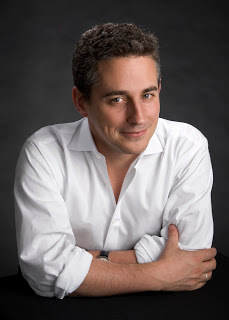
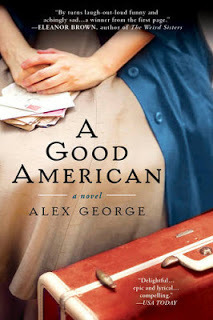
One of my favorite books of the year has got to be Alex George's A Good American, now in paperback. It pulses with life as it follows an immigrant family through decades of fascinating history, and it's captured all of the best adjectives: moving, funny, unforgettable. Plus, Alex is one of the most wonderful people around. I'm thrilled to have him back on the blog (any time, Alex. My blog is your blog). Thank you for this great essay.
A LIFE LIVED ELSEWHERE
For the past forty years or so, my parents have lived in an ancient market town about seventy miles west of London. I spent a week there last summer with my children. When we weren’t watching the Olympics, we took my parents’ dog, a lovely old black Labrador, around the same fields where I used to walk her predecessors as a teenager. As we went past the pristine cricket pitches of the local private school and trekked through the adjacent dilapidated cemetery, I was struck by how reassuringly familiar it all was. It’s been almost twenty-five years since I left home, but the intervening time always vanishes as I walk past the familiar landmarks of my youth.
I live four thousand miles away from my parents now, in central Missouri. I moved to the States almost ten years ago, and although I am happy here, every time I return to England I am struck by both joy and a sense of loss. Missouri has natural charms of its own, of course, but they are not the same – by which I mean, of course, that they are not mine. I can admire the lakes, the trails, and the sunsets of the Midwest, but they are not freighted with the same warmth of memory that enriched those rambles with my parents’ aging dog.
Paradoxically, England seems to exert a stronger claim over me the longer that I live in America. I find myself increasingly nostalgic for my own childhood, perhaps because I am now finally at an age when I can look back with fondness, rather than toe-curling embarrassment. As I walk the streets of the town where I grew up, the past rushes back up to me. The candy shop where I spent my weekly pocket money is still there. I remember the delicious agony of Saturday mornings as I tried to decide what to buy – my favorites were sherbet lemons which I would suck on until the roof of my mouth was sore. Then, much later, there were the dark winter afternoons skulking behind the trees at the back of the supermarket parking lot, anxiously puffing on my first illicit cigarettes. With these memories comes a palpable sense of belonging. This place feels like where I should be. It feels, in other words, like home.
My novel, A Good American, explores the complex relationship that immigrants have with the concept of home. It tells the story of a young couple who leave Germany in 1904 and forge a new life for themselves in America. There is a paradox inherent in the immigrant experience: you want to embrace your new country, but you don’t want to forget where you came from. Living with both ideas can be a delicate balancing act. To examine this, I performed a weird act of authorial schizophrenia, and split myself down the middle. I attributed all of my positive emotions about moving to America to Frederick, the young husband, who embraces his newly adopted country with unwavering fervor. In contrast, his wife struggles with homesickness, and is forever looking forlornly back across the Atlantic. Seeing this contrast play out across the pages of my novel helped me come to terms with my own bifurcated existence. And it was considerably cheaper than therapy.
Even now, having lived here for almost a decade, I am confronted by daily reminders that this is not the country I grew up in. There remains a vast cultural chasm down which I am apt to tumble at inopportune moments. Whether it’s people’s obsession with college sports or Sean Hannity, there are things that I guess I’ll just never understand. When confronted by these, I often feel an outsider all over again, and am ambushed by homesickness.
A life lived elsewhere is full of such conundrums. My daily life is in America, with my children, but my roots will always be in England. Such is the bittersweet paradox of immigrant life. And so, for me, home is an amorphous thing, shifting and mutating from one day to the next. There’s no place like it.
Published on January 31, 2013 14:47
January 29, 2013
Rochelle Jewel Shapiro, author of Kaylee's Ghost, talks about What Haunts You
Good friend Rochelle Jewel Shapiro, author of the novel Kaylee's Ghost (Kirkus gave it a rave) is on the blog again today to talk about why writing about what haunts you is so important. Honored to have her here! Thank you, Rochelle.
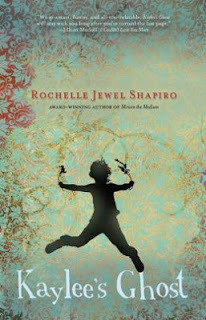

WHAT HAUNTS YOUBy Rochelle Jewel Shapiro
Maybe you’ve convinced yourself that the person-shaped shadow you glimpsed from the corner of your eye must be one of those floaters you heard people can develop and you will ask your ophthalmologist about. And surely that whispering you heard was the wind, no matter how breezeless the day. And that whiff of roses you smelled while walking mid-winter on a desolated stretch of boardwalk must be someone’s perfume. Still, you have to admit that something haunts you. And that’s what you need to write about! That’s what will be the most vivid, most compelling to your readers.
According to dictionary.com, one of the definitions of haunting is “to recur persistently to the consciousness.” Miriam Kaminsky, my heroine in both Miriam the Medium (Simon & Schuster) and my newest novel, Kaylee’s Ghost, a phone psychic like myself, is such a big part of my consciousness that people call me Miriam and I answer to it. And her Russian grandmother from whom she inherited her psychic gift as I did mine is so much in my psyche that every morning I see her sitting at my dining room table, sipping a glass of tea, the steam fogging her small silver-rimmed eyeglasses. I can even smell the lavender talc that she powder-puffed onto her creased neck.
I’m haunted by the tragic plight of people who have had to flee from their homelands because of religious or political persecution as my paternal grandmother fled her Russian village with her five surviving children (five sons murdered in the pogrom) and my husband’s parents escaping Hitler’s Europe. The immigrant experience is always part of my consciousness, part of my writing. Whenever I see or read about people fleeing countries or huddled in refugee camps, it doesn’t matter how different their backgrounds, I feel that I know them intimately, that they are my people. And I know their generations, how they will carry the experience, be haunted by it.
Another thing that stays with me, that is part of my writing, my psyche, is those moments of giddiness that can happen even when things seem at their worst. For example, both in waking life and in dreams, I can see my maternal grandpa, Eli, pale and heavy, falling down our long flight of steps like a float in a Macy’s Thanksgiving Day Parade, then landing dead-still at the foot of the stairs. In my gut, I feel my childhood terror when my grandmother pulled up his eyelids and there were no pupils. I can see her pinching his nose to make him swallow the dose of strong laxative, her cure for everything. Then I hear his stomach growl to life, watch him hobble top-speed to the toilet.
Writing about what haunts you will help you stay the long course of a novel, from its inception to its final word. Watch and listen for the energies of your imagination—or is it the spirits?—who will guide you and not let go.
Rochelle Jewel Shapiro is a phone psychic. Articles have been written about her psychic gift in Redbook, The Jerusalem Post, the Dutch Magazine, TV GID, and the Long Island section of the New York Times. She’s chronicled her own psychic experiences in Newsweek (My Turn), and The New York Times (Lives) which can be read on her website at http://rochellejewelshapiro.com.twitter @rjshapiro
Rochelle Jewel Shapirohttp://rochellejewelshapiro.com
Published on January 29, 2013 11:58



